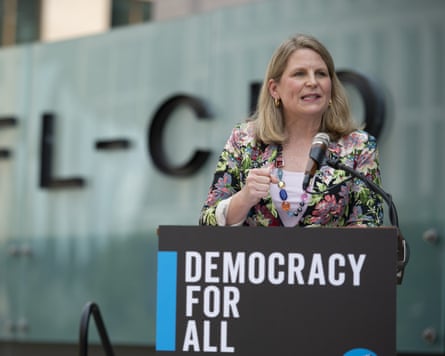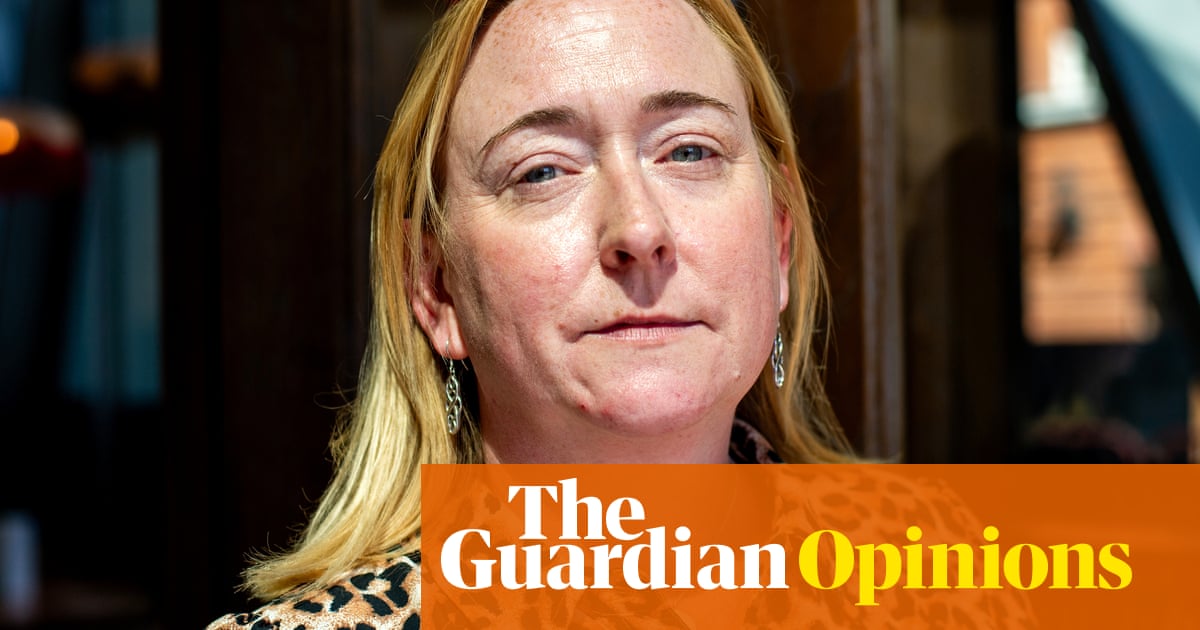Naomi Anderson was on leave looking after her young baby when she was told her US Department of Agriculture job helping farmers in developing countries was being cut. A former volunteer with the Peace Corps, which sends young Americans overseas to projects in emerging economies, Anderson had expected to spend her whole career in international development.
“I had taken this job two years ago expecting to stay here for at least 10 years, and you know, we had started to make a community and build up our life here. In January, we had started looking at buying a home,” she says.
Now Anderson is having to consider giving up the apartment in the Washington DC commuter town of Reston, Virginia, that she shares with her husband and their four-month-old baby and almost two-year-old toddler.
“Financially, it’s a little bit precarious, and honestly we’re not sure what we’re going to do,” says Anderson, who is also an activist with the local branch of the AFSCME union and dabbles in selling political merchandise. “We’re thinking about moving back to Ohio, where I’m from, where my family is. You know, it’s a lot cheaper there.”
Anderson is far from alone. “In our apartment complex, there’s been lots of yard sales, people selling things and moving away. It really does seem like people are just picking up and leaving, because it’s too expensive to live here without a job,” she says.
Tough life-decisions like these have been forced on hundreds of thousands of former federal employees in the past couple of months, as the so-called department of government efficiency (Doge), which is headed up by Donald Trump’s favourite tech billionaire, Elon Musk, has slashed jobs in a cost-cutting spree.
Data from the latest monthly Challenger jobs report suggests Doge has been responsible for 281,452 layoffs so far – almost eight times the number of workers the government let go in the entire year to April 2024.
Brendan Demich is among those to be laid off, losing his job as an engineer at the National Institute for Occupational Safety and Health (NIOSH) in Pittsburgh, Pennsylvania. All his colleagues working on mine safety, as well as those in their sister laboratory who tested equipment such as respirators, are also being laid off – more than 200 in total – as part of a wave of cuts initiated by Trump’s health secretary, Robert F Kennedy Jr.
“So many people are devastated,” says Demich, who is a branch representative for the AFGE union. He says so many workers have been removed at once that their colleagues have barely been able to give them any kind of send-off. “It’s just unceremoniously leaving, because they had their package processed and they had to walk out the door.”
Each of these layoffs has its own human impact, but experts are warning of a growing risk that they combine to trigger an economic retrenchment – particularly in areas with a heavy concentration of government jobs.

Liz Shuler, the president of the AFL-CIO federation of 63 trade unions, which together represent more than 15 million US workers, is trying to build a nationwide campaign to highlight the devastating impact of the cuts.
“The trick is connecting the dots because there’s already a national narrative around what’s happening but it’s not quite being felt yet,” Shuler says. “Elon [Musk] has his ‘department of government efficiency’. We established the ‘department of people who work for a living’. That’s kind of cheeky, but it’s kind of serious, because we’re saying we’re the ones working on the frontlines. We know what’s efficient and what’s not.
“Obviously as the labour federation we’re worried about jobs and people’s livelihoods, but it’s also connected to community, and the fact the economy is being impacted in such a stark way, that ripples out across all of the industries that we represent,” she adds.
These ripples are being felt especially strongly in the towns and counties around Washington DC, where job losses and government cuts crop up constantly in conversation.
Kate Bates is the president of the chamber of commerce in affluent Arlington, Virginia, across the Potomac River from the US capital. She compares the current uncertainty to the pandemic, “but during Covid, the federal government was the backstop, whereas right now it’s the federal government that’s causing a lot of this,” she says.
Bates reports that her members are warning of a slowdown across real estate and hospitality, as well as among government contractors, with several reporting they have already had to make job cuts.
“What we hear from a lot of people is that if they could plan for the cuts, they would be in an OK position, right? But because things are changing, going back and forth, that’s causing a lot of stress,” she says.

Businesses that rely on government workers for custom are also feeling the chill. Saamir Nizam, the general manager of Arlington’s Barley Mac restaurant, which is part of a small family-owned chain, has noticed trade declining in just about every one of their usual customer groups.
The nearby hotels are less occupied; bookings for “happy hour parties” by the accountants and consultants who serve the federal government are down by two-thirds; and many older local residents have been spooked by market volatility.
“We can only do so much to turn things around: we can’t pull people to Washington, or convince companies to go out and do things,” Nizam says.
“Barley Mac serves great food, it gives great service; but it exists, like many restaurants, on the financial margin. And if the whole year is on the margin then restaurants like ours will go under, because we’re not part of a huge national chain which has deep pockets.”
after newsletter promotion

Jess Miller, who set up Rock Spring Real Estate Solutions a couple of years ago, has been hosting a breakfast roundtable for clients, on the top floor of an as yet unoccupied new office block in Arlington.
She has noticed clients responding to the shifting climate, pulling out of deals and hoping to negotiate unusually short leases. The owners of this building are splitting the floors instead of looking for one anchor tenant.
“Just how they’re making decisions is different – the cutbacks we’re seeing,” Miller says. “It hit the NGOs first and then it hit, you know, the corporations and the contractors, and it’s a lot of the senior management.”
Katherine D’Zmura Friedman is a co-founder and the chief executive of Thumbprint, an Arlington-based startup offering an artificial intelligence platform for designing office layouts.

“There’s no universe in which something like the last few months happens and there’s not serious consequences,” she says. “We’ve had family friends, we’ve had neighbours lose their jobs, and these are not people who would normally be subject to layoffs. These are people who are at the peak of their career, and hyper-specialised.”
As far as the business effects are concerned, D’Zmura Friedman says: “Certainly on the commercial side, there’s been hesitancy about launching into things.”
At her office nearby, Renata Briggman, a residential estate agent, plays down the idea that the housing market in Arlington could be hit, pointing to the many local employers broadly unaffected by federal spending – such as Amazon, which is headquartered here.
However, she does acknowledge signs of change. “It’s definitely shifting. We’re not seeing any fire sales, it’s too soon for that. It’s very, very slow, and we’re just going to start seeing it, it’s just on the cusp … end of June, we’ll have a better idea.”

Such challenges are being replicated across the region. Jimmy Olevson, the president and chief executive of National Capital Bank, which serves Washington DC and the surrounding areas, says the bank is not yet seeing signs of financial distress, such as rising arrears, but the mood is “uneasy”. Many customers who have had a recent mortgage application approved seem to have put househunting on hold.
Some experts fear this widespread mood of unease bodes badly for the coming months. Analysis by Dr João Ferreira, an expert in regional economics at the University of Virginia, suggests more than 320,000 people in the state are employed directly by the federal government – and another 441,000 jobs depend on taxpayer-funded contracts, of the kind that are being cut.
In some sectors – construction, for example – the same firms fretting about whether their contract will be cut are also contending with the rising price of materials, as a result of tariffs. Although some of the border taxes have been paused or reduced, those restrictions that remain mean costs are still far higher than at the start of the year.
In theory, the Trump administration could lift the gloom by drawing a line under budget cuts as Musk heads back to his day job running the electric carmaker Tesla. But key members of the cabinet, including Kennedy and the defence secretary, Pete Hegseth, have boasted of how much they plan to slash from their budgets – and White House trade policy continues to see-saw.
Ferreira says: “I think, as an economist, I’ve never seen so many things happening at the same time. But they all lead to the same direction, and that’s a recession.”
He says Virginia has often been cushioned from economic downturns in the past by federal funding, but in this cycle he expects the state to lead the way. “We definitely might see that Virginia, and other regions like Maryland, will be the frontrunners in this recession period,” Ferreira says.
Meanwhile, for many of the affected individuals, the future looks highly uncertain – despite the US treasury secretary Scott Bessent’s suggestion they should go work in manufacturing. “For us on our team, we work in international development,” says Anderson. “We have a background in humanitarian work, and the Trump administration is trying to cut international foreign aid. So where do you go from there?”

 3 hours ago
5
3 hours ago
5













































